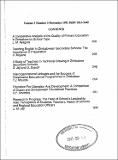| dc.contributor.author | Dzvimbo, K. P. | |
| dc.coverage.spatial | Zimbabwe | en_GB |
| dc.coverage.spatial | Cuba. | en_GB |
| dc.date.accessioned | 2014-10-08T15:14:30Z | |
| dc.date.available | 2014-10-08T15:14:30Z | |
| dc.date.issued | 1991-11 | |
| dc.identifier.citation | Education For Liberation And Development: A Comparison Of Cuban And Zimbabwean Educational Practices, ZJER Vol. 3, no. 3. Harare, Mt. Pleasant: HRRC. | en_GB |
| dc.identifier.issn | 1013-3445 | |
| dc.identifier.uri | https://opendocs.ids.ac.uk/opendocs/handle/20.500.12413/4689 | |
| dc.description | A journal article. | en_GB |
| dc.description.abstract | The aim of this paper is to examine the contradictions experienced by Zimbabwean policy makers in their efforts to use education in the socialist transformation of a post-colonial state in which capitalism was the dominant mode of production. Zimbabwe, like most settler colonial countries in Sub-Saharan Africa inherited a well developed European educational system, and an underdeveloped African educational system which had been used by various colonial and settler governments to oppress the African majority and marginalize them from major political and economic activities in the country. The new regime of Robert Mugabe that came into power in 1980 after fourteen years of a protracted guerrilla warfare also inherited an underdeveloped rural sector were 80% of the population lived and a well developed urban oriented economic structure that was dominated by a small white settler community of 250,000 people.
For comparative purposes, Cuba will be used as an example (not as an ideal type) of a developing nation in the process of consolidating its socialist revolution, now threatened by events in Eastern Europe. For both Zimbabwe and Cuba, centralized planning was adopted instead of a free market economy in which the laws of supply and demand would prevail. This paper will also examine the problems associated with centralized planning in education since participation of civil society in policy making is difficult to realize in command economies like the one the Zimbabwean regime has tried to establish. In both countries, mass education was seen as the major vehicle for the transition to socialism. | en_GB |
| dc.language.iso | en | en_GB |
| dc.publisher | Human Resourse Research Centre, (HRRC), University of Zimbabwe. | en_GB |
| dc.rights.uri | http://creativecommons.org/licenses/by-nc-nd/3.0/ | en_GB |
| dc.subject | Development Policy | en_GB |
| dc.subject | Education | en_GB |
| dc.title | Education For Liberation And Development: A Comparison Of Cuban And Zimbabwean Educational Practices. | en_GB |
| dc.type | Article | en_GB |
| dc.rights.holder | University of Zimbabwe. | en_GB |


